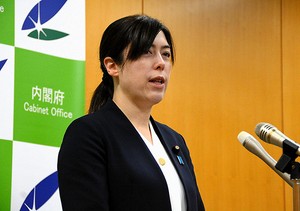THE ASAHI SHIMBUN
April 13, 2024 at 16:34 JST
 The building in Tokyo’s Chiyoda Ward that houses the Consumer Affairs Agency and other government organizations (Asahi Shimbun file photo)
The building in Tokyo’s Chiyoda Ward that houses the Consumer Affairs Agency and other government organizations (Asahi Shimbun file photo)
An emergency survey by the Consumer Affairs Agency turned up 117 instances of health problems linked to food products promoted as having health benefits.
The preliminary survey was carried out in response to a scandal over supplements sold by Kobayashi Pharmaceutical Co. that are linked to at least five deaths in Japan.
It covered 6,795 products made by 1,693 companies registered as manufacturers of functional food products.
The 117 cases were reported by doctors and other medical professionals to the product manufacturers.
As of April 12, the agency said 1,395 businesses manufacturing 5,551 products had responded. The response rate was 81.7 percent on a product basis. Of these, 3,914 products, or 70.5 percent, were still being sold.
Several cases required hospitalization, the agency said.
However, it has not yet established a causal relationship between the health problems and the food products, leaving open the possibility other factors were responsible.
In the case of Kobayashi Pharmaceutical, it has still not been established how its popular “benikoji” health supplements became tainted.
The companies that responded to the survey determined that none of the health issues that cropped up merited reporting to the agency.
The agency's consumer food labeling division agreed, stating, "Specific symptoms are not concentrated in any particular product, and at this stage we do not believe that any immediate action is necessary."
Still, the agency plans to get medical and other experts to analyze the survey results and publish the findings in the future.
The survey asked two questions: whether or not medical professionals had provided information on health hazards, and if so, why they had not reported it to the agency.
In a related development, the Ministry of Health, Labor and Welfare revealed in an Upper House Special Committee on Consumer Affairs on April 12 that from June 2020 to April 2023, four cases of health issues stemming from functional foods had been reported to the ministry.
(This article was written by Mihoko Terada and Mika Omura)




















A peek through the music industry’s curtain at the producers who harnessed social media to help their idols go global.
A series based on diplomatic documents declassified by Japan’s Foreign Ministry
Here is a collection of first-hand accounts by “hibakusha” atomic bomb survivors.
Cooking experts, chefs and others involved in the field of food introduce their special recipes intertwined with their paths in life.
A series about Japanese-Americans and their memories of World War II